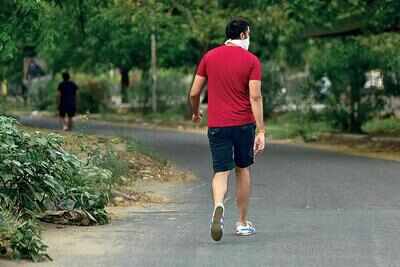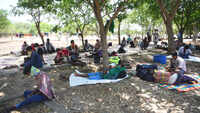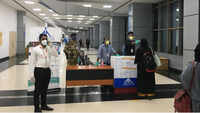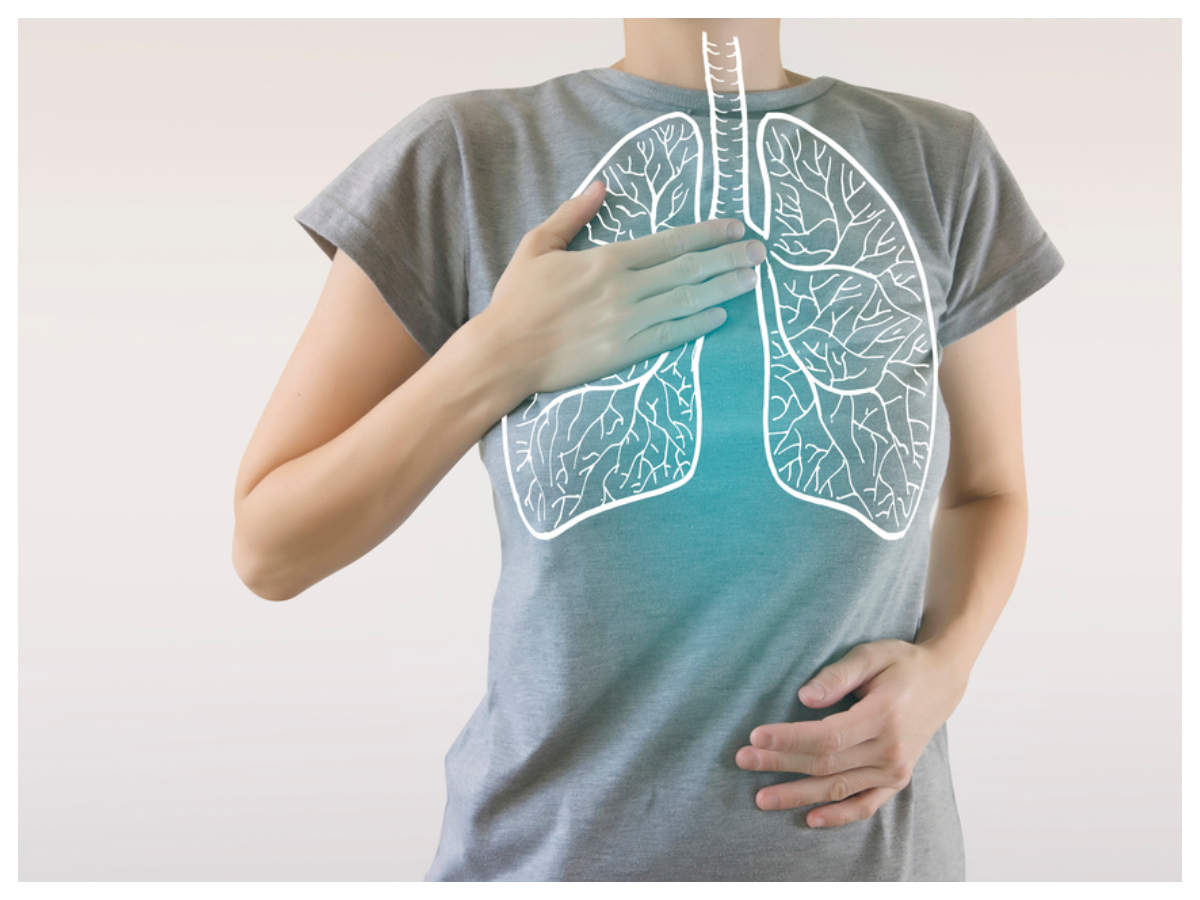
NOIDA: As governments think of ways to ease lockdown curbs, reviving the economy and opening up offices and shops, residents of Noida find themselves asking a question that involves the most basic of liberties.
‘Why can’t we go out for a walk?’Walking continued to be ‘not allowed’ in the Noida administration’s directives issued earlier this week. You’re only allowed to walk, for 15 minutes, if you have a pet. A 15-minute walk, though, could do a world of good to those who don’t have pets, too. Walking is a stress-reliever, improves blood circulation, makes one fitter, and boosts the body’s immune functions. In times of a pandemic, immunity is key. So, why should people be stopped from walking, especially when parks are closed anyway, masks are mandatory and awareness about social distancing is high?
The lockdown has been a long one, and curbs are likely to continue for some time, one way or another. People are feeling more strain and anxiety with every passing week as normal life remains suspended, and a further restriction on personal movement is unlikely to help with the coping mechanism, doctors say.
Dr D Sharma, advisor, Apollo Hospitals, Delhi says walks are good for lungs and the joints, especially in case of senior citizens. Walking, he says, should be allowed to avoid health issues that arise from lack of physical and mental fitness. “We are almost nearing two months of lockdown now. Given this long duration and an expected extension of the lockdown, there is no harm in allowing walks within gated complexes if residents maintain necessary social distancing norms with safety gear such as masks and gloves, etc. After all, we are educated people living in a civil society and aware of the dangers associated with congregating. No one is that illiterate to not follow safety norms in residential sectors,” he says.
Dr Sharma, who was associated with Northern Railways and is a former director of Central Hospital, feels restrictions on walking can affect a person’s mental framework. “We are living in times where there’s extreme loneliness faced by people, especially senior citizens, because of the rise of nuclear families. It can become very difficult to deal with this loneliness. This can lead to psychological issues of depression, restlessness and loneliness. Walking can help them get over this as it will bring the necessary change of scene after long hours of being cooped up indoors,” he says.
Dr Ajay Aggarwal, director (internal medicine) at Fortis Hospital in Noida, says there’s no scientific logic in not allowing residents to take their daily walks. “There are certain guidelines because of Covid-19 which do not follow any scientific reasoning and not allowing morning and evening walks is one of them. Coronavirus doesn’t spread to each other in parks. It spreads with fomites. If a person walks practising adequate social distancing and avoids sitting and gossiping, then it doesn’t spread,” says Dr Aggarwal.It’s important to use safety gear such as gloves, masks, etc, he adds. “It is very important that people continue with physical exercise and walking outdoor helps maintain physical and mental health. Diabetics and heart patients should continue their exercises. We have to learn to live safely as well as healthily as the novel coronavirus is going to stay for long time,” says Dr Aggarwal.
Dr Colonel SK Sayal (retd), a resident of Sector 28 and senior consultant with a few private hospitals in Noida, says senior citizens with comorbidities should remain indoors but others can go for walks if they observe necessary safety precautions. The government, he says, can only have a lockdown for a certain period of time. “The government will also not show such strictness because it has made you aware about Covid-19, social distancing, hand sanitisation, etc. The future of you and your family is in your hands. Do you think, after May 17, the corona will suddenly go away and we will start living like before? Not at all. This virus has taken root in our country and we have to learn to live with it,” he adds.
‘Why can’t we go out for a walk?’Walking continued to be ‘not allowed’ in the Noida administration’s directives issued earlier this week. You’re only allowed to walk, for 15 minutes, if you have a pet. A 15-minute walk, though, could do a world of good to those who don’t have pets, too. Walking is a stress-reliever, improves blood circulation, makes one fitter, and boosts the body’s immune functions. In times of a pandemic, immunity is key. So, why should people be stopped from walking, especially when parks are closed anyway, masks are mandatory and awareness about social distancing is high?
The lockdown has been a long one, and curbs are likely to continue for some time, one way or another. People are feeling more strain and anxiety with every passing week as normal life remains suspended, and a further restriction on personal movement is unlikely to help with the coping mechanism, doctors say.
Dr D Sharma, advisor, Apollo Hospitals, Delhi says walks are good for lungs and the joints, especially in case of senior citizens. Walking, he says, should be allowed to avoid health issues that arise from lack of physical and mental fitness. “We are almost nearing two months of lockdown now. Given this long duration and an expected extension of the lockdown, there is no harm in allowing walks within gated complexes if residents maintain necessary social distancing norms with safety gear such as masks and gloves, etc. After all, we are educated people living in a civil society and aware of the dangers associated with congregating. No one is that illiterate to not follow safety norms in residential sectors,” he says.
Dr Sharma, who was associated with Northern Railways and is a former director of Central Hospital, feels restrictions on walking can affect a person’s mental framework. “We are living in times where there’s extreme loneliness faced by people, especially senior citizens, because of the rise of nuclear families. It can become very difficult to deal with this loneliness. This can lead to psychological issues of depression, restlessness and loneliness. Walking can help them get over this as it will bring the necessary change of scene after long hours of being cooped up indoors,” he says.
Dr Ajay Aggarwal, director (internal medicine) at Fortis Hospital in Noida, says there’s no scientific logic in not allowing residents to take their daily walks. “There are certain guidelines because of Covid-19 which do not follow any scientific reasoning and not allowing morning and evening walks is one of them. Coronavirus doesn’t spread to each other in parks. It spreads with fomites. If a person walks practising adequate social distancing and avoids sitting and gossiping, then it doesn’t spread,” says Dr Aggarwal.It’s important to use safety gear such as gloves, masks, etc, he adds. “It is very important that people continue with physical exercise and walking outdoor helps maintain physical and mental health. Diabetics and heart patients should continue their exercises. We have to learn to live safely as well as healthily as the novel coronavirus is going to stay for long time,” says Dr Aggarwal.
Dr Colonel SK Sayal (retd), a resident of Sector 28 and senior consultant with a few private hospitals in Noida, says senior citizens with comorbidities should remain indoors but others can go for walks if they observe necessary safety precautions. The government, he says, can only have a lockdown for a certain period of time. “The government will also not show such strictness because it has made you aware about Covid-19, social distancing, hand sanitisation, etc. The future of you and your family is in your hands. Do you think, after May 17, the corona will suddenly go away and we will start living like before? Not at all. This virus has taken root in our country and we have to learn to live with it,” he adds.

Coronavirus outbreak
Trending Topics
LATEST VIDEOS
More from TOI
Navbharat Times
Featured Today in Travel
Quick Links
Kerala Coronavirus Helpline NumberHaryana Coronavirus Helpline NumberUP Coronavirus Helpline NumberBareilly NewsBhopal NewsCoronavirus in DelhiCoronavirus in HyderabadCoronavirus in IndiaCoronavirus symptomsCoronavirusRajasthan Coronavirus Helpline NumberAditya ThackerayShiv SenaFire in MumbaiAP Coronavirus Helpline NumberArvind KejriwalJammu Kashmir Coronavirus Helpline NumberSrinagar encounter
Get the app







